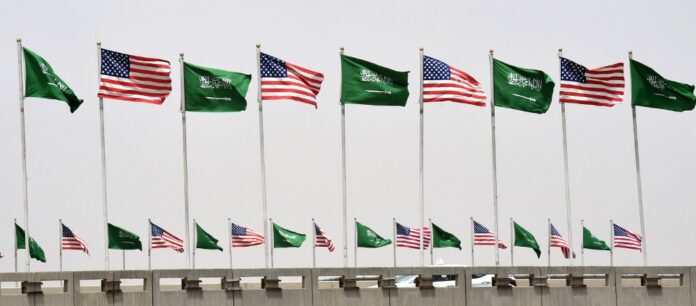U.S. President Donald Trump has announced a landmark $600 billion investment commitment from Saudi Arabia into the United States, marking one of the largest economic and defence cooperation efforts between the two allies to date. The deal includes nearly $142 billion in defence agreements and was unveiled during Trump’s high-profile visit to Riyadh, where he was received with fanfare by Crown Prince Mohammed bin Salman (MbS) and top Gulf officials.
Trump, accompanied by business leaders including Elon Musk, OpenAI CEO Sam Altman, and BlackRock CEO Larry Fink, participated in the Saudi-U.S. Investment Forum at the King Abdulaziz International Conference Center. “I really believe we like each other a lot,” Trump said during his meeting with MbS. “Oh, what I do for the crown prince,” he later added with a grin, as the two signed agreements covering energy, defence, mining, and technology.
Trump’s visit focused heavily on business and economic growth rather than traditional regional security matters. “It’s their time to shine,” Trump declared, referring to Syria, as he announced the lifting of U.S. sanctions on the war-torn nation. “Show us something very special, like they’ve done, frankly, in Saudi Arabia, OK?” he added.
Trump’s pivot away from previous U.S. administrations’ human rights-driven foreign policy was clear: “Too many American presidents found themselves afflicted by the notion that it’s our job to look into the souls of foreign leaders and use U.S. policy to dispense justice for their sins,” he said. Instead, Trump advocated pragmatic cooperation to drive prosperity in the region.
During his remarks, Trump offered extensive praise to MbS and posed, “Mohammed, do you sleep at night? Or are you up, restless, thinking, ‘How do I make it even better?’” In return, the Saudi investment minister Khalid al-Falih emphasized the broadening of U.S.-Saudi economic ties beyond oil: “When Saudis and Americans join forces, very good things happen—more often than not, great things happen.”
The agreements signed include what is being described by U.S. officials as the largest-ever defence sales deal between the countries. Although it remains unclear whether the highly sought Lockheed F-35 jets are part of the package, two sources briefed on the discussions confirmed that the purchase was under serious consideration.
Musk was seen chatting with both Trump and MbS at the palace reception and joined the president for a formal lunch alongside executives from Blackstone, Google, Amazon, Uber, Palantir, and other major U.S. firms.
MbS’ Vision 2030 reform plan, aimed at reducing Saudi Arabia’s economic reliance on oil, was front and center. The ambitious initiative includes Giga-projects like NEOM, a high-tech city the size of Belgium. Yet rising costs and volatility in oil markets have forced the kingdom to scale back some of its goals.
While celebrating regional partnerships, Trump reaffirmed U.S. opposition to Iran’s influence in the region. “Iran’s leadership has caused unthinkable suffering in Syria, Lebanon, Gaza, Iraq, Yemen and beyond,” he said, even as U.S. and Iranian negotiators met in Oman over the weekend to discuss curbing Tehran’s nuclear ambitions. Trump warned of potential military action if diplomacy fails.
A notable moment in his address came when Trump expressed hope that Saudi Arabia would soon join the Abraham Accords. “You’ll do it in your own time,” he said, acknowledging Riyadh’s current hesitance due to Israel’s ongoing war in Gaza. Applause followed his pledge to lift sanctions on Syria, but the room fell silent when he brought up the prospect of normalization with Israel—highlighting the political complexities still looming over Trump’s regional ambitions.
Trump’s trip continues to Qatar and the United Arab Emirates later this week, with a focus on investment opportunities. He has notably excluded Israel from the itinerary, sparking quiet concerns among Israeli officials. His envoy, Steve Witkoff, said progress on expanding the Abraham Accords is expected imminently, but sources note that Prime Minister Benjamin Netanyahu’s rejection of a Palestinian state or a ceasefire in Gaza is a major stumbling block for any Saudi-Israel breakthrough.
As Saudi Arabia and the U.S. strengthen economic ties, the visit underscores a broader shift in American foreign policy under Trump—from moral posturing to economic realism.




